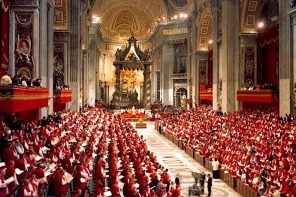In the New York Times, Ross Douthat cheers the conservative rebuff at the recently concluded family synod of the “implied papal position” favoring liberalization both “in the church’s attitude toward nonmarital relationships” and in “admitting the divorced-and-remarried to communion.”
Douthat says that conservatives had no choice but to block the new policies despite their backing by Pope Francis because any move to recognize nonmarital relationships—beyond a slightly more understanding attitude toward “the cross carried by gay Christians” (who, for the record, I’m pretty sure don’t see their sexuality as a “cross”)—is impossible:
[A] kind of celebration of the virtues of nonmarital relationships generally … might open a divide between formal teaching and real-world practice that’s too wide to be sustained. And on communion for the remarried, the stakes are not debatable at all. The Catholic Church was willing to lose the kingdom of England, and by extension the entire English-speaking world, over the principle that when a first marriage is valid a second is adulterous, a position rooted in the specific words of Jesus of Nazareth. To change on that issue, no matter how it was couched, would not be development; it would be contradiction and reversal.
But the Catholic Church has in the recent past evolved its teaching to meet changes in the real world—especially on “family” issues. Pope Pius XII approved the use of family planning (albeit of the natural variety) for Catholics in the 1950s as birth control become more acceptable. Vatican II changed the church’s doctrine on marriage from emphasizing procreation as the primary purpose of marriage to recognizing that the union of the couple was equally important, which acknowledged the rise of companionate marriage in the twentieth century.
If the church had been evolving doctrine in a more gradual, holistic manner over the past several decades, the changes being proposed now wouldn’t seem so dramatic. But a pair of popes—John Paul and his long-time doctrinal henchman Benedict—conspired to freeze the natural development of Catholic teaching. They took uber-conservative readings of key issues, like the ordination of women and the “intrinsically disordered” nature of gay Catholics, and then declared them virtually infallible, so that any future evolution was by its very nature heretical.
To conservatives, Catholic doctrine has become like a game of capture the flag—if you can hold onto the flag long enough, you win, regardless of the advisability of the original teaching.
Not only is a change in the teaching on remarriage and divorce impossible theologically, says Douthat, but “[s]uch a reversal would put the church on the brink of a precipice” and “sow confusion among the church’s orthodox adherents—encouraging doubt and defections, apocalypticism and paranoia (remember there is another pope still living!) and eventually even a real schism.”
To Douthat, it is these “orthodox adherents,” who, while admitted in the minority, are the true Catholics and the ones Francis should be worrying about:
[T]hey are the people who have done the most to keep the church vital in an age of institutional decline: who have given their energy and time and money in an era when the church is stained by scandal, who have struggled to raise families and live up to demanding teachings, who have joined the priesthood and religious life in an age when those vocations are not honored as they once were. They have kept the faith amid moral betrayals by their leaders; they do not deserve a theological betrayal.
Of course, it’s the lack of doctrinal evolution that has alienated many progressive Catholics or forced them into a tenuous relationship with the institutional church, fueling its decline, but apparently they don’t merit the same consideration. It’s less sensus fidelium and more postulat a fidele, with loyalists to a particular conservative agenda demanding an outsized say in the church by dint of their orthodoxy.
It’s fine, Douthat says, for Francis to noodle around with annulment reform or to wax poetic about “social justice,” but he better not make any real changes, or else:
“[I]f he moves to reassign potential critics in the hierarchy, if he seems to be stacking the next synod’s ranks with supporters of a sweeping change — then conservative Catholics will need a cleareyed understanding of the situation.
They can certainly persist in the belief that God protects the church from self-contradiction. But they might want to consider the possibility that they have a role to play, and that this pope may be preserved from error only if the church itself resists him.
So get with the program, Francis. Don’t go all Jesus-like and seek radical change or you might find your collection plates a little empty.
And that’s the crux of Francis’ challenge. The changes he is promoting, while actually quite modest, are significant enough to alienate conservatives, but probably not radical enough to bring back progressives… which may mean more empty pews to go along with those empty plates.




